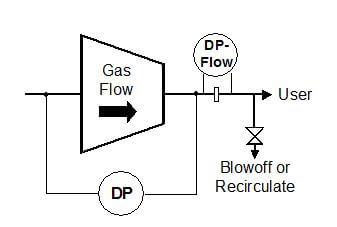Some of our most consistently popular posts here at Emerson Process Experts center on anti-surge control for centrifugal compressors. I had the opportunity to catch up with Emerson’s Ashish Patki when he was in town last month.
 Ashish shared a story where a national oil company was setting up an oil & gas processing facility in the Middle East in which a DeltaV control system will be used. As part of the production process, separated gas from the wells is compressed in a 4-stage centrifugal compressor. The anti-surge protection system on the compressor, as well as capacity control system for the compressors has been implemented in the DeltaV system. He noted that the factory acceptance test for the DeltaV system has been recently completed successfully.
Ashish shared a story where a national oil company was setting up an oil & gas processing facility in the Middle East in which a DeltaV control system will be used. As part of the production process, separated gas from the wells is compressed in a 4-stage centrifugal compressor. The anti-surge protection system on the compressor, as well as capacity control system for the compressors has been implemented in the DeltaV system. He noted that the factory acceptance test for the DeltaV system has been recently completed successfully.
 Ashish highlighted some of the project challenges. This was the first instance where the oil & gas producer as well as the engineering, procurement, and construction (EPC) contractor were getting a complex control scheme for anti-surge and capacity control system within the control system.
Ashish highlighted some of the project challenges. This was the first instance where the oil & gas producer as well as the engineering, procurement, and construction (EPC) contractor were getting a complex control scheme for anti-surge and capacity control system within the control system.
There were expectations on what the system should be able to achieve, but very little information on what would be required to make this work. The producers and EPC provided their requirements in the form of preliminary control narrative, which had to be interpreted and completed based on knowledge of how the process would respond under various scenarios.
For the compressor section, being a key and critical section of the process, it was imperative that safety of the process equipment and ability of the control strategy to effectively handle foreseeable scenarios be addressed. The time available to configure, test and deploy was short due to schedule pressures on the oil & gas producer to meet their production and profitability objectives.
During the preliminary input review phase of the project, Emerson’s Sanjay Jadhav and Shekhar Walkikar, the engineering manager and project manager for the project from the engineering center in Pune, India saw the need, and discussed with the simulation team for a solution to meet these needs.
 The engineering team consisting Prasad Chavan, Tanmay Joshi and Amol Ambavale worked to conceptualize a “native DeltaV”-based dynamic simulation model of the compressors, and interfaced the configured control scheme for anti-surge and capacity control with the model. Having the model in DeltaV environment affords a rapid model build, with no additional cost for third party software licensing, and a seamless interface with the control configuration in the DeltaV system. With the model as well as the control configuration being in DeltaV, changes to and updates to the control configuration were simple and direct.
The engineering team consisting Prasad Chavan, Tanmay Joshi and Amol Ambavale worked to conceptualize a “native DeltaV”-based dynamic simulation model of the compressors, and interfaced the configured control scheme for anti-surge and capacity control with the model. Having the model in DeltaV environment affords a rapid model build, with no additional cost for third party software licensing, and a seamless interface with the control configuration in the DeltaV system. With the model as well as the control configuration being in DeltaV, changes to and updates to the control configuration were simple and direct.
The simulation model was then run to depict foreseeable operational scenarios. Data from the “scenario runs” was collected in the form of trends, and used for analysis of the effectiveness of the control configuration in addressing each of these scenarios, as well as identification of need for changes to ensure safety of the equipment or plant would not be compromised.
Ashish noted that despite only conceptual inputs, the exercise enabled identification of changes that would be necessary to make the control strategy more effective. The revisions made to the control scheme could also be tested again with the simulation to help ensure that foreseeable scenarios were addressed, and the behavior of the plant would be within safe operating conditions.
Trends obtained from these tests were demonstrated to the EPC team during design review to help analyze the behavior of the system. The analysis helped greatly to boost confidence of the EPC and project team in the configuration and the control scheme.
The post Process Simulation to Test Compressor Anti-Surge Control Strategy appeared first on the Emerson Automation Experts blog.